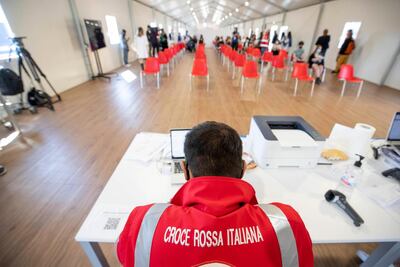"Be fast, have no regrets," was the advice of Dr Michael J Ryan, head of the World Health Organisation's health emergencies programme, to governments in March 2020. In the earliest days of the pandemic, experts such as Dr Ryan were not mincing their words on the need for speed. A number of countries heeded his call – others didn’t.
However, even in some countries with leading vaccination rates, the number of cases continues to rise. The phenomenon underscores the variable ability of different vaccines to stop transmission, even when they are effective at preventing severe illness. The writing on the wall is that until vaccines are in the hands of the greatest number of people – a process that some experts say could take years – Covid-19 will remain with us. Bringing about a post-pandemic world, however, does not have to mean eliminating the virus altogether. Rather, it will depend on our ability to reduce its impact on our health and daily lives.

The world will owe a great deal to the scientists who have rapidly developed, alongside vaccines, therapeutic treatments for Covid-19. Among the more promising treatments are monoclonal antibodies – manufactured molecules that mimic an immune system's response to the spike proteins on the surface of a coronavirus particle. The US Food and Drug Administration, which regulates medicines in the American market, has approved a handful of monoclonal treatments for emergency use. Although one has seen its approval revoked due to questions over its ability to fight emergent strains of the virus, the others are thought to be effective against a wide array of variants.
None of the monoclonals approved in the US, however, have been rolled out widely among the American population. One reason is that the first monoclonals were introduced last winter, just as the first effective vaccines were coming to market. US health policy officials consequently focused largely on vaccine rollouts rather than therapeutics. Another reason is logistical roadblocks; because monoclonals are currently administered intravenously and to patients who are not yet ill enough to be hospitalised, overwhelmed US hospital staff have often found the treatment too labour-intensive.
But not all healthcare systems are in the same place during this pandemic, and some are better poised to make use of monoclonals now. The UAE, which has already administered 130 vaccine doses per 100 people, last week became the first country to license Sotrovimab, an FDA-approved monoclonal, and make it immediately available for widespread patient use. Developed by British drug maker GlaxoSmithKline and US-based Vir Biotechnology, Sotrovimab can reduce the risk of hospitalisation or death in high-risk patients by up to 85 per cent when administered early enough.
The ongoing global campaign for Covid-19 vaccination is among the most important efforts of our time. It demands our unceasing commitment. But vaccination should not be our only strategy. Therapeutic treatments will play an enormous role in reducing harm, saving lives and carving a way out of the pandemic.
The virus that causes Covid-19, as the makers of monoclonals know well, thrives on variation. In order to control it and, perhaps, one day rid ourselves of it for good, our response ought to be varied, too.


